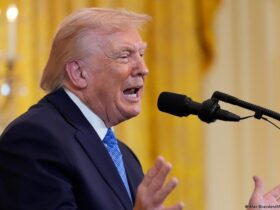Newly appointed US President Donald Trump wasted no time in signing an executive order that throws the idea of a global corporate minimum tax into chaos.
The international agreement, which was conceived and endorsed by the Organization for Economic Co-operation (OECD), was endorsed by former President Joe Biden and about 150 other countries.
Trump’s executive order makes it clear that prior US support and commitments are null and void. Without Congressional action “the global tax agreement has no force or effect in the United States”, as per document,
It is an effort to reclaim “our country’s sovereignty and economic competitiveness” and to move against foreign tax practices that could lead to “retaliatory international tax regimes” for US companies, it went on.
What will the global tax agreement do?
The OECD-backed deal has two parts:
1. Ensuring that big companies pay taxes at all,
This means that a global minimum tax of 15% will be imposed on the profits of large multinational corporations. If they do not pay at least 15% in their home countries, other countries may charge them a “top-up” tax.
The rule only applies to companies that report global revenues of €750 million ($782 million) or more. This high hurdle means that only about 100 global digital companies would be subject to such a rule.
2. Making companies pay certain taxes Where? Profit is earned.
This means that some taxable income will be shifted, and taxed, where it is earned, rather than where a company is headquartered or has a physical presence.
Is America’s participation necessary for any deal?
For such a global deal to work efficiently, the US needs to be part of it – not least because many of the companies that will be targeted are American companies like Amazon, Apple, Google and Facebook.
“The failure of the agreement is a real possibility due to US non-participation in the deal,” Robert Dever told DW last July. “Unfortunately, this means that the success of the deal will likely remain hostage to the political situation in Washington,” said Dublin-based partner and Irish tax practice lead at Pinsent Masons, a multinational law firm.
Several countries have introduced OECD-supported rules, while others are still in the process of doing so or reconsidering their participation.
The US never ratified the deal as Biden was unable to get enough votes in Congress, meaning there are no immediate changes for US-based businesses after the country turned its back on the deal this week.
Global Tax and Tariff Threats
Republicans in Congress have long been against the deal, but Kimberly Clausing, a professor at UCLA School of Law who specializes in tax law, said they disagreed about why.
“First, they said they couldn’t tax these companies because foreign countries would just undercut America. Now they say they want to tax these companies themselves because foreign countries have raised their rates.”
“This about-face exposes the Republicans’ true colors,” Clausing told DW. “They don’t want American multinationals to have to pay taxes anywhere.” “So they’re adopting a deal with tariff retaliation.” “They are hoping to weaken the agreement by threatening the countries.”
However, the tariffs are likely to raise prices for American consumers and lead to inflation. Not taxing the world’s most profitable companies also runs contrary to the “populist rhetoric” used by Trump, who portrays himself as a cheerleader for American workers, Clausing said.
“This is just an attempt to shift the tax burden from the rich and put it on the poor,” he said.
Leaving the agreement is another way for Trump to “try to extract policy from other countries,” Clausing said.
Do all roads lead to tariffs?
Clausing, deputy assistant secretary for tax analysis at the US Treasury Department during the first part of the Biden administration, believes other countries can keep the deal alive by sticking to minimum taxes in exchange for access to their markets.
Companies that do not want to pay may avoid doing business in these countries. To function without US cooperation, these countries will need unwavering cooperation, especially as the US government will not take kindly to countries that unilaterally tax US companies.
To thwart these efforts prematurely, Trump’s executive order gave the head of the Treasury and the United States Trade Representative 60 days to “investigate whether any foreign country has any Is not complying with a tax treaty or has any tax rules.” location, or are likely to impose tax rules that are extrajudicial or disproportionately affect U.S. companies.”
Companies face one-sided digital services tax
With hopes of a global tax agreement being realized dim, countries are expected to compete against each other and reach unilateral tax rules.
France, Italy, Spain, the UK, India and New Zealand already have “digital services taxes” in place. Others are likely to implement or reactivate them soon.
Digital services tax is a tax on the revenues of companies that provide services such as online advertising, data usage, e-commerce or streaming. These taxes ensure that countries can tax profits generated in their local markets, even if these companies do not have a physical presence there.
However, unilateral taxes can lead to more unilateral action. The mix of an “America First” policy, corporate taxes, and the threat of tariffs could be a recipe for chaos.
Edited by: Rob Mudge






Leave a Reply